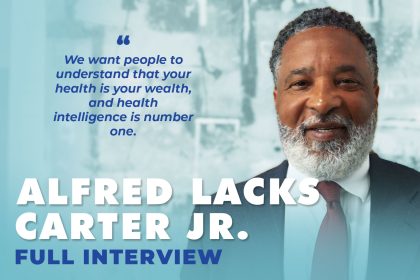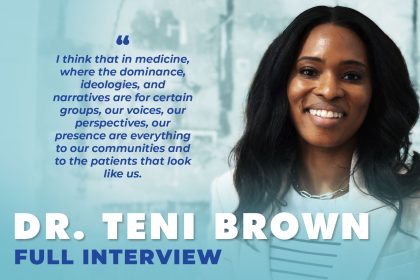Eva Coleman’s story resonates when talking about her breast cancer journey. After learning that she had stage one breast cancer, Coleman didn’t hang her head low or get defeated; instead, she fought and kept faith in God that things would be all right. With her mother, daughters, and tribe by her side, she did not have to go through her journey alone, and she’s inspiring and uplifting others to continue to fight.
Coleman is a Telly award-winning producer with over 28 years of professional experience in television, radio, and newspapers in Dallas-Fort Worth. She is the lifestyle and culture editor for I Messenger Media LLC print and online publications and the communications director for Aubrey Independent School District. For over a decade, she served as executive producer of Frisco ISD-TV in Frisco, Texas.
What started your breast cancer journey?
I got a call saying that they wanted to bring me back in for testing to do a biopsy. They saw something abnormal on my mammogram, which I get every single year, and I was like, “OK, I’ll be back.” … I wasn’t nervous about it, because I felt like whatever it was, it was new because I had a normal reading the year before. There was not a bunch of fear or anxiety going in for the biopsy. On Dec. 29, 2022, that’s when I got the call saying I was positive for cancer, and I knew exactly what I was doing at that moment. I was actually in my bathroom in my home, getting dressed to head to my youngest daughter’s basketball game in another city, and I took that news, stepped it up, and went to the game because I had to be there for my baby.
Did you ever had a breast cancer conversation with your mom, or with anyone close to you?
I know mine was stage one, and it was a fast-growing tumor. I was told because of the time frame between me having perfectly normal readings the year before to abnormal the next year, that let me know it was fast growing. I did have some small estrogen positive, but it was so tiny, that they treated me as if I was triple negative. I had not had a breast cancer conversation, I just know that mammograms are so important and I get them every year. On my mother’s side of the family, she has several of her first cousins who were diagnosed and some who’ve lost their lives to breast cancer. I knew it was in my family, but again, it was my mother’s cousin, so not a direct impact. We constantly talk about health in my family. I’m a widowed mom, I lost my husband to cancer, so I’m very direct with my children. We’ve seen what cancer does to a person’s life, and we watched their dad succumb to his illness, so health conversations are common in my household. I remember my girls being 10 and 4 when their dad passed away, and them having to see and witness all of the torture and torment that cancer was doing to his body, we never shielded them from that, and we were very honest with them.
How did you share the news with your circle?
When I got the news, I went to the basketball game to watch my daughter play ball. I got back home and I made sure that I told my daughters separately because I wanted them to have their own time and their own emotions that were not dependent on someone else in the room, but just me and them individually. I made sure that they had their time. There were some tears, and it was very emotional for both of them, but I just assured them that, I ain’t going nowhere. It was caught early. We are so grateful and thank God that it was caught early and detected early.
How did your mom help you through the journey?
My mom was my ride-or-die. She was there for every single doctor’s appointment. She made sure she was right by my side. She’s always been that type of mom, we have a great relationship. My mother was there as my second set of ears because there were a lot of doctor’s appointments, and there was so much information coming at you at once.
What was the treatment plan?
My immediate treatment plan was first to have surgery to remove the tumor. I had a lumpectomy, so that’s just going in and removing the tumor itself. Following that lumpectomy, I had radiation, and I only had to have like five sessions of radiation. They were some pretty strong sessions, and then I did four rounds of chemotherapy that were three weeks apart. That was my treatment plan, and what’s interesting is that I have so many women that I talked to, and they’re like, “Well, why was yours done in this order? Why did you do surgery first?” Because some people do radiation first, then chemo, then surgery, or chemo, surgery and radiation. I tell them, we’re all individuals, we’re all different. Doctors determine these treatment plans based on your type of tumor based upon its location, and whether it’s impacted the lymph nodes. That was my prayer going in because I didn’t want it to affect my lymph nodes, and it had by a very small amount. Had it not, then I would not have had to get chemotherapy. But because it impacted my lymph nodes, I had to go the route of chemotherapy.
What tips can you share with women going through breast cancer?
My faith was everything for me and is everything for me. I constantly relied on God to help me push through what I was facing. Second, when I went to the doctor, I asked a lot of questions. I also made sure I wrote down things because you can ask the questions, and then if you don’t have some type of way to recall the answers you were given, you’ll be very confused in the process. I constantly took notes, I made sure that I had a doctor that I trusted, and that I felt good about. I felt good about my providers, and I think you can tell early on if it’s someone you’re not comfortable with.
If you’re not comfortable, find another doctor, because if you’re not comfortable from the start, that’s going to always kind of creep up in your head and you’ll be way down the road saying “I knew I didn’t trust them” or “I knew I didn’t feel comfortable with them.” You never want to have any regretful moments like that, so if you’re uncomfortable, my suggestion is to find a different doctor immediately. Go with your gut.
Tell us about the relationship between you and your advocate.
I think that having someone in the room with you is key, because you want someone to be able to confirm what you think you heard, and sometimes that’s conflicting information. You may think you heard one thing and your advocate may have heard something else, but because you’re so wrapped up in the moment, probably 9 times out of 10, what your advocate heard was probably the most accurate. As you’re going through this, there are so many emotions that pop up, there’s so many things because a lot of times people automatically go to this death sentence phase. I always tell people that just because you’re diagnosed with cancer it is not an automatic death sentence. Try your best to quell that emotion, because it’s not, and it doesn’t have to be.
















